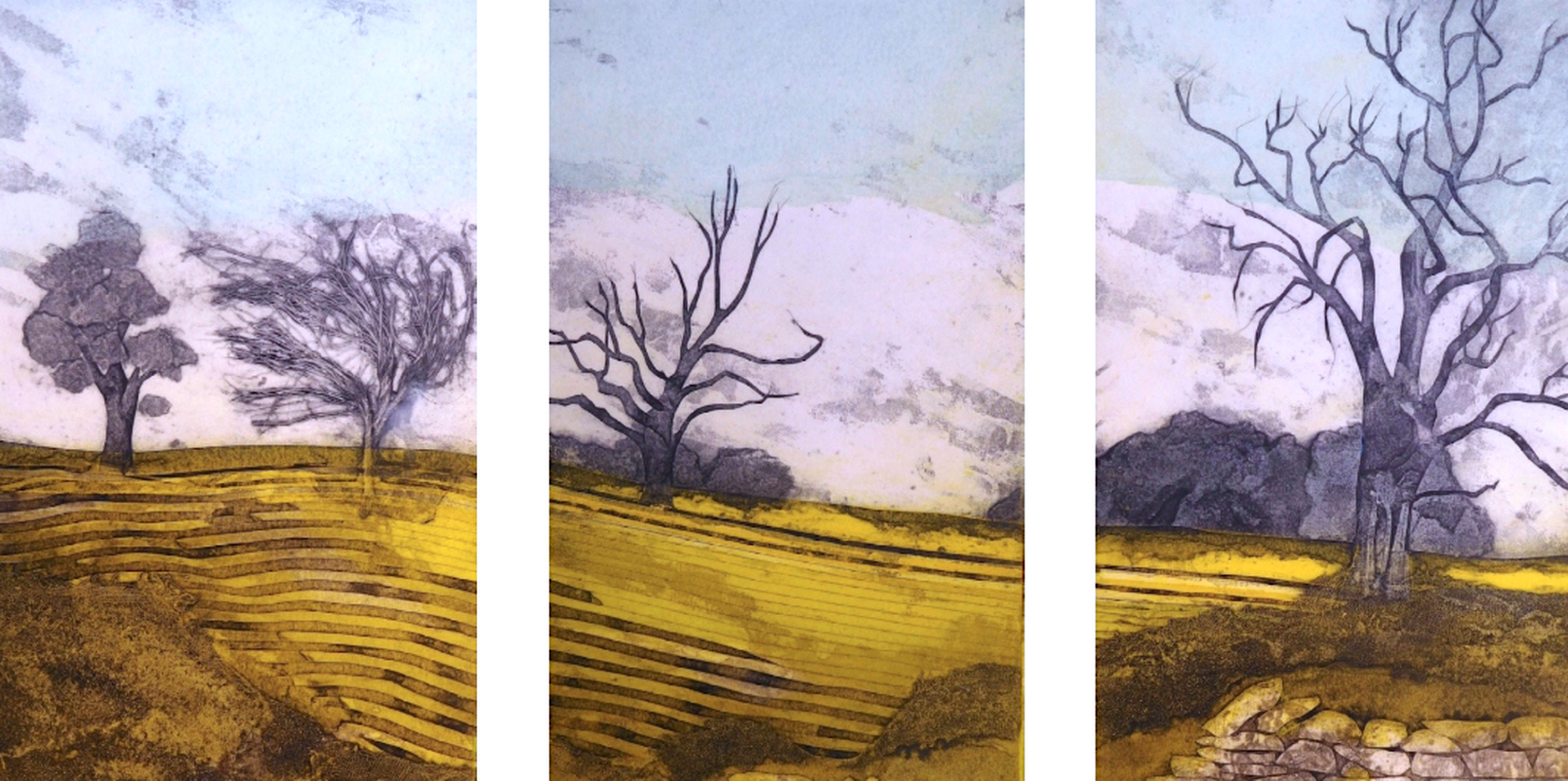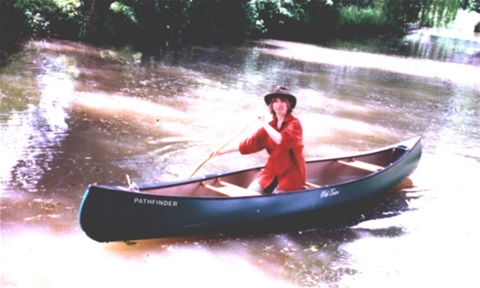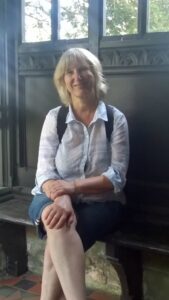
SARAH ROSS-THOMPSON AND THE ART OF COLLAGRAPHED PRINTS
I interviewed artist Sarah Ross-Thompson whose exceptional Collagraphed prints use fabrics, lichen, porridge and string to create images of the dramatic Scottish Highlands where she


 My father owned an air rifle and I started using it as a teen on empty plastic washing up liquid bottles in the back garden. I wasn’t a bad shot either, and dad began calling me Annie Oakley, which I thought was brilliant! I’ve joked in recent years that I must be reincarnated from Calamity. My parents told me that two great-great uncles, only one of them a blood ancestor, had emigrated to British Columbia during the gold rushes of the 1890s and that the West must be in my genes/jeans. Finding out about them has been part of my research into family history – yet another interest.
My husband Graham, who’s looked after me throughout my depression, is my soulmate and best friend. We’re like a couple of kids, especially now I’m literally cured, and he’s the one who’s encouraged and inspired me to pursue all my passions. He’s the one who helped me develop my Wild West image, and he’s developed his own persona. You can read about it on my website: www.kitty-le-roy.co.uk
Incidentally, Kitty Le Roy was a fully armed shootist and gambler killed in a shootout by husband number five during the 1880s in Dallas,Texas. I loved the idea of her from an article I read in Titbits magazine many moons ago, and my grandmother was Kitty, so Kitty I had to be! After my children were born I found Western groups I could join and costumes to wear, including holstered blank firing Colt revolvers. My husband and I got involved in fast draw contests, but we actually hated them! I did them on principal, being female, and Graham was supporting me. In recent years we created a living history camp. We also joined a local club for Western ’round ups’, until depression and anxiety reared its ugly head and stopped me getting involved for a few years. We attended our first camp last year, and after my initial nerves and a few tears, met old friends, made new ones, and will definitely be camping again this year.
As for my other interests:
My father owned an air rifle and I started using it as a teen on empty plastic washing up liquid bottles in the back garden. I wasn’t a bad shot either, and dad began calling me Annie Oakley, which I thought was brilliant! I’ve joked in recent years that I must be reincarnated from Calamity. My parents told me that two great-great uncles, only one of them a blood ancestor, had emigrated to British Columbia during the gold rushes of the 1890s and that the West must be in my genes/jeans. Finding out about them has been part of my research into family history – yet another interest.
My husband Graham, who’s looked after me throughout my depression, is my soulmate and best friend. We’re like a couple of kids, especially now I’m literally cured, and he’s the one who’s encouraged and inspired me to pursue all my passions. He’s the one who helped me develop my Wild West image, and he’s developed his own persona. You can read about it on my website: www.kitty-le-roy.co.uk
Incidentally, Kitty Le Roy was a fully armed shootist and gambler killed in a shootout by husband number five during the 1880s in Dallas,Texas. I loved the idea of her from an article I read in Titbits magazine many moons ago, and my grandmother was Kitty, so Kitty I had to be! After my children were born I found Western groups I could join and costumes to wear, including holstered blank firing Colt revolvers. My husband and I got involved in fast draw contests, but we actually hated them! I did them on principal, being female, and Graham was supporting me. In recent years we created a living history camp. We also joined a local club for Western ’round ups’, until depression and anxiety reared its ugly head and stopped me getting involved for a few years. We attended our first camp last year, and after my initial nerves and a few tears, met old friends, made new ones, and will definitely be camping again this year.
As for my other interests:
 Rowing. We owned a clinker-built dinghy. I learned to row as early as I could. In later years, owning our Canadian canoe seemed the natural thing to do, associated as it is with the Wild West!
Rowing. We owned a clinker-built dinghy. I learned to row as early as I could. In later years, owning our Canadian canoe seemed the natural thing to do, associated as it is with the Wild West! Leslie: What sparks your creativity, please? What is the process you go through to flesh out your feelings into a concrete form?
Jo: I take zillions of photos on my phone of anything that catches my eye for future reference. People, the landscape, colours, shapes. I collect antique curios and some of these can spark ideas. When an idea sparks, if it’s an art idea, I decide which medium to use – acrylics, gouache, pastels, pencil, and the image grows organically. I never plan, it just happens. The same with writing. I have an idea and out it tumbles, except it usually has to be edited afterwards. I have my favourite artists and movements, including Mucha, Aubrey Beardsley, Art Nouveau, Art Deco, Charles Rennie Mackintosh, Arts and Crafts…
Leslie: What sparks your creativity, please? What is the process you go through to flesh out your feelings into a concrete form?
Jo: I take zillions of photos on my phone of anything that catches my eye for future reference. People, the landscape, colours, shapes. I collect antique curios and some of these can spark ideas. When an idea sparks, if it’s an art idea, I decide which medium to use – acrylics, gouache, pastels, pencil, and the image grows organically. I never plan, it just happens. The same with writing. I have an idea and out it tumbles, except it usually has to be edited afterwards. I have my favourite artists and movements, including Mucha, Aubrey Beardsley, Art Nouveau, Art Deco, Charles Rennie Mackintosh, Arts and Crafts…
Next week, in the second part of my interview with Jo Clutton, she talks very honestly and openly about her family and depression, her medication crisis and how that led to her recovery.
ABOUT LESLIE TATE’S BOOKS:
I interviewed artist Sarah Ross-Thompson whose exceptional Collagraphed prints use fabrics, lichen, porridge and string to create images of the dramatic Scottish Highlands where she

Part 2 of my interview with Mark Statman looks closely at Mark’s Latin American poetic influences, his life in Mexico and ends with an extract

I interviewed international poet and translator Mark Statman about Volverse/Volver, his 14th published collection. Mark, who has won national arts awards, is Emeritus Professor of Literary

I interviewed Lisa Dart, finalist in the Grolier, Aesthetica and Troubadour Poetry Prizes and author of The Linguistics of Light (poems, Salt, 2008), Fathom (prose

I interviewed writer Julia Lee Barclay-Morton about her experience of autism. Julia began as an experimental dramatist in New York, moving to the UK to
| Cookie | Duration | Description |
|---|---|---|
| cookielawinfo-checkbox-analytics | 11 months | This cookie is set by GDPR Cookie Consent plugin. The cookie is used to store the user consent for the cookies in the category "Analytics". |
| cookielawinfo-checkbox-functional | 11 months | The cookie is set by GDPR cookie consent to record the user consent for the cookies in the category "Functional". |
| cookielawinfo-checkbox-necessary | 11 months | This cookie is set by GDPR Cookie Consent plugin. The cookies is used to store the user consent for the cookies in the category "Necessary". |
| cookielawinfo-checkbox-others | 11 months | This cookie is set by GDPR Cookie Consent plugin. The cookie is used to store the user consent for the cookies in the category "Other. |
| cookielawinfo-checkbox-performance | 11 months | This cookie is set by GDPR Cookie Consent plugin. The cookie is used to store the user consent for the cookies in the category "Performance". |
| viewed_cookie_policy | 11 months | The cookie is set by the GDPR Cookie Consent plugin and is used to store whether or not user has consented to the use of cookies. It does not store any personal data. |
10 responses
A lovely interview, Jo and Leslie. Jo’s interest are certainly very diverse and interesting. My son, Michael, is also very interested in shooting and has an absolute passion for guns and swords.
What I find particularly interesting, Robbie, is these passions in a woman – going against the stereotype and proving that life is more complicated and endlessly, fascinatingly diverse!
?! I was never into the whole domestic sphere – just found them tedious and dull. Even if I’d been well while raising my kids I would have been bored rigid! Hence I did a lot of voluntary work with babe in arms, just to get out of the house. When you’ve been to college, travelled a fair bit, love creativity and rather off beat interests, the last thing one needs is comfortable domesticity. I always felt that traditionally male interests were so much more exciting!
Inspiring and encouraging life storytelling from Jo in response to your questions Leslie. Thanks for sharing.
Thanks, Chrys. I think you’ll find next week’s continuation, with its unfortunate overuse of medication triggering a crisis, all-to familiar.
Very good Leslie, I look forward to reading it.
Thank you so much Robbie! My son Tom loves what I do and he’s got a small collection of swords. Occasionally we rifle shoot together.
Thank you so much Chrys! That’s what I aim for with my blog – inspire and encourage, I hope!
Thank you so much, Leslie! I’m delighted, and having fun sharing!
Jo
Thank you, Jo. I’m looking forward to part two next week.